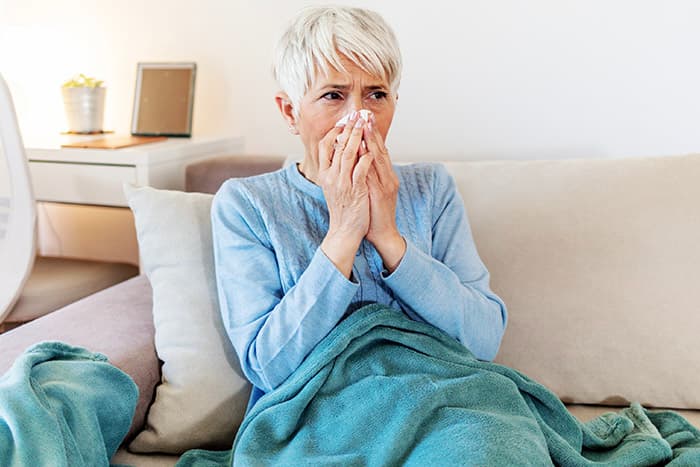Pneumonia is a serious lung infection that can be especially dangerous for older adults. As we age, our immune systems weaken and our lungs become more susceptible to infection, putting older adults at a higher risk of contracting pneumonia. Additionally, chronic health conditions common in seniors, such as heart disease, diabetes, and COPD, can further increase the chances of developing this potentially life-threatening illness.
Fortunately, there are steps older adults can take to help prevent pneumonia and reduce the risk of serious complications. From getting recommended vaccinations to practicing good hygiene, there are several things seniors can do to keep themselves healthy and safe. In this article, we’ll discuss what pneumonia is and list helpful tips that seniors can use to prevent it.
What is pneumonia?
Pneumonia is a respiratory infection that causes inflammation in one or both lungs. It is typically caused by bacteria, viruses, or fungi that infect the air sacs within the lungs, known as alveoli. When these air sacs become inflamed and filled with fluid or pus, it becomes difficult for the lungs to function properly, leading to symptoms like cough, fever, chills, and difficulty breathing. Bacterial pneumonia symptoms can develop suddenly and include:
High fever
Sweating
Increased breathing/pulse rate
Bluish lips/nails
Confusion
Viral pneumonia symptoms develop more gradually, starting with:
Fever
Dry cough
Headache
Muscle pain/weakness
Symptoms then worsen to include:
Increased coughing
Shortness of breath
High fever
Pneumonia is a serious condition that can range in severity from mild to life-threatening, especially for older adults, so it’s crucial for seniors to be aware of it and take proactive steps to prevent and manage it.
How can seniors prevent pneumonia?
Luckily, there are steps older adults can take to significantly reduce their risk of developing this potentially life-threatening illness. These include:
Get Vaccinated: Vaccination is one of the most effective ways to prevent pneumonia in seniors. The Centers for Disease Control and Prevention (CDC) recommends that all adults 65 and older receive the pneumococcal vaccine, which protects against the most common form of bacterial pneumonia. Additionally, the annual flu shot and the COVID-19 vaccine can help prevent pneumonia caused by viruses. Older adults should talk to their healthcare provider about which vaccines are right for them.
Practice Good Hygiene: Proper handwashing is crucial for preventing the spread of the germs that cause pneumonia. Seniors should wash their hands frequently, especially before eating and after coughing, sneezing, or using the restroom. Avoiding close contact with people who are sick can also lower the risk of infection. When seniors are out and about in public places, having antibacterial hand sanitizer with them in their purse, pocket, or car can help in a pinch.
Quit Smoking: Smoking damages the lungs and impairs the body's ability to fight off respiratory infections. Quitting smoking can significantly reduce an older adult's chances of developing pneumonia. Healthcare providers can offer cessation resources and support to help seniors kick the habit.
Maintain Overall Health: Keeping the immune system strong is key to preventing pneumonia. Older adults should focus on eating a nutritious diet, staying physically active, and managing any underlying health conditions, such as heart disease or diabetes. Regular check-ups with a healthcare provider can also help identify and address any issues that could increase pneumonia risk.
Be Aware of Symptoms: It is important to recognize the early signs of pneumonia, as prompt treatment can greatly improve outcomes. Older adults should be on the lookout for symptoms like fever, cough, chest pain, and shortness of breath and seek medical attention right away if they experience these issues.
Protect Your Health as You Age with The Medicare Helpline
Preventing pneumonia and other illnesses is just one aspect of healthy aging. There are a variety of activities and practices seniors can use to maintain their physical and mental health to continue living independently for as long as possible. For more advice on healthy aging, explore more lifestyle articles from The Medicare Helpline.
More Lifestyle Articles
